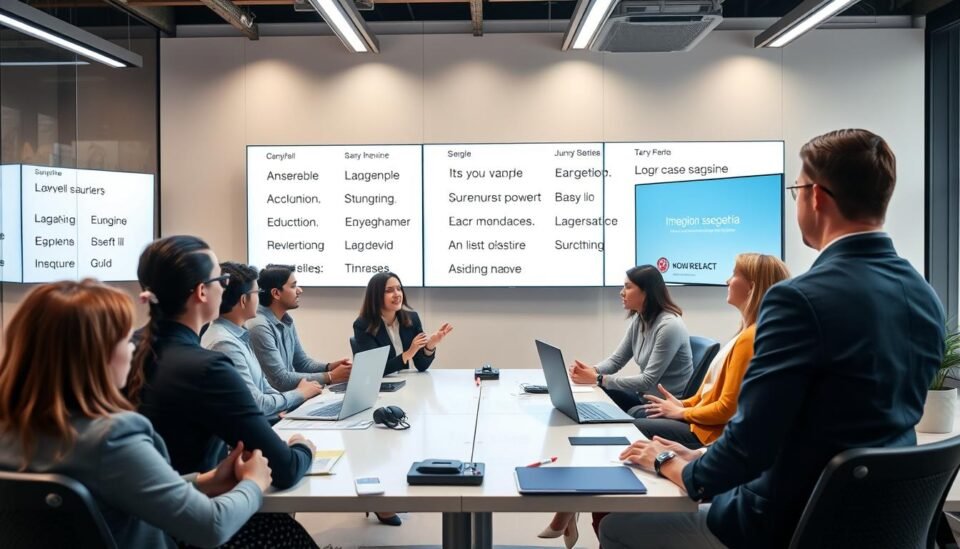The phrase “I would love to learn more” can sound overused in work talks. It’s good to find new ways to show your interest.
Better words can prove your business communication skills. They show your genuine interest in the topic.
Let’s explore other ways to say “I would love to learn more”. These new phrases can help you talk better at work.
Understanding the Importance of Communication
Good communication is key to success at work. It helps build strong relationships and gets better deals.
Professional language and manners are vital. They shape how others see you and your credibility.
Clear talking helps in tough situations. It can solve problems and make teamwork better.
Your words matter in meetings and talks. They can change how things turn out.
Learning to talk well makes you look smart. It helps you do better in your job.
Common Scenarios to Use Alternatives
These phrases can help steer business meetings in a more productive direction. They allow participants to express interest and gather information effectively.
At networking events, these alternatives can make a strong first impression. They show genuine curiosity about the person you’re talking to and their work.
In emails, these phrases strike a balance between professionalism and friendliness. They convey your interest without seeming too eager.
Choose the alternative that fits the context and your goal. Use the right tone and language to make a lasting, positive impression.
Creative Language Alternatives
Professional communication skills are vital in today’s business world. Professionals can use creative phrases to show their interest and enthusiasm.
These expressions show a real desire to learn. They also highlight one’s commitment to growth and development.
You could say, “I’m intrigued by this topic. I’d love to learn more about the details.”
Or try, “This project has sparked my curiosity. I’m eager to understand it better.”
These options show your interest. They also suggest you’re ready to learn and work together.
You can link your interest to company goals. Try saying, “I’d love to see how this could help our team.”
Using these phrases can improve your communication skills. They can also show you’re a valuable team member.
Context-Specific Phrases
Using the right words in different jobs is key. Your choice of phrases can make a big impact when talking to experts.
Matching your words to the field shows you know your stuff. It helps you have better talks with people in that job.
In health care, you might say, “I want to learn about new treatments.” This shows you care about what’s new in their work.
For tech, try “Your team’s new ideas are amazing.” This tells them you know about their cool gadgets.
Using words that fit the job helps you connect better. It shows you get what matters to them.

Learning job-specific words is a great skill. It helps you talk better and show you’re an expert.
Ensuring Clarity and Intent
Choosing clear phrases to show interest is vital. Clear communication helps avoid mix-ups and understand messages better.
Pick words that address the main point directly. Stay away from vague language that might confuse people.
Try phrases like “I’m curious to learn more” or “Can you share more details?”
Think about how your words might sound to others. The setting and your relationship affect how people understand you.
Clear talk helps avoid mix-ups and makes chats better. Pick words that show your interest and fit the situation well.
Balancing Formality and Friendliness
Finding the right mix of professionalism and friendliness is key in business talks. This balance can lead to stronger bonds and better teamwork.
Different situations call for different levels of formality. Formal settings need a more structured approach. Casual settings allow for a friendlier tone.
The right balance builds trust and open talks. It can create a sense of team spirit.
Mixing formal and casual talk can be tricky. Team events and casual chats can help build relationships.
Clear limits and set processes are still important. They keep the overall tone professional.
The right balance creates a culture of openness and professionalism. This can lead to better teamwork and a more driven workforce.
Encouraging Feedback and Dialogue
Good talks involve more than just sharing facts. They include open questions and careful listening.
Open questions invite deeper talks. Try asking “What do you think about this?”
Active listening is key for good talks. Show interest by restating points and asking for details.
This builds trust and teamwork. It creates a space where people feel free to share.
These methods lead to better understanding. They also help create new ideas and stronger bonds.
Practical Tips for Effective Communication
Good communication is key in the workplace. Listen carefully to your coworkers to understand their views.
This shows you care and helps you respond better. Ask open-ended questions to encourage deeper talks.
These questions lead to more ideas and teamwork. Keep your messages short and clear.
Use simple words instead of fancy ones. This makes it easier for others to understand you.
It also shows you’re professional and care about your audience.
